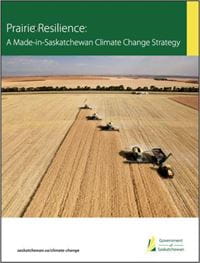Prairie Resilience
The province launched Prairie Resilience: A Made-in-Saskatchewan Climate Change Strategy, in December 2017. The strategy employs natural systems and technological innovation to reduce greenhouse gas emissions while protecting competitiveness, prioritizing affordability, and enhancing sustainable growth and development. Prairie Resilience is a practical strategy to strengthen Saskatchewan’s resilience to the effects of a changing climate while recognizing that climate change cannot be effectively addressed without the resources provided by a strong, sustainable economy. Prairie Resilience has an integral role in Saskatchewan’s Growth Plan by encouraging actions that enhance sustainable growth.

Under Prairie Resilience, Saskatchewan is reducing emissions through a range of agricultural practices, including the sequestration of carbon through zero and low tillage, the use of 4R nutrient stewardship to promote efficient fertilizer application, and the reduction of methane through use of innovative animal feed. Through Prairie Resilience, Saskatchewan also introduced the Methane Action Plan (MAP) which, along with the Output-Based Performance Standards Program, has reduced GHG emissions from venting and flaring in the upstream oil and gas industry by 71 per cent since 2015.
Technological innovation also plays a key role in our climate change strategy. For example, the province’s support for carbon capture, utilization and storage (CCUS) is expected to encourage $2 billion in investment and sequester over two million tonnes of CO2 each year. Saskatchewan is a world leader in enhanced oil recovery (EOR) carbon capture, which emits 37 per cent fewer emissions than traditional extraction methods. Over the last 25 years, Saskatchewan’s EOR projects have sequestered more than 50 million tonnes of CO2.
Saskatchewan’s Output-Based Performance Standards (OBPS) Program is the province’s industrial emissions program and another key component of Prairie Resilience. The OBPS Program is designed to reduce industrial emissions while protecting economic competitiveness by preventing carbon leakage – when production moves to jurisdictions with less stringent environmental regulations.
Under Prairie Resilience, the province’s OBPS Program requires reductions in emissions intensity across most sectors of the economy. Effective January 1, 2023, changes to the OBPS Program increased emission reduction requirements, expanded the number of facilities and emissions covered under the program, and introduced a CCUS credit program that will further incentivize reductions in industrial emissions.
OBPS-regulated industrial emitters that go over their permitted emission levels must either purchase and/or retire performance credits or CCUS credits, or pay compliance into the Saskatchewan Technology Fund. This fund uses a competitive application process to support industry-driven initiatives that reduce emissions at regulated facilities.
To date, the OBPS Program has been highly effective:
- The OBPS Program saved regulated emitters over $3.3 billion for 2019-22 and is projected to save $14 billion by 2030 compared to federal carbon pricing.
- 100 per cent of regulated emitters have met their compliance obligations under the OBPS program.
- The Saskatchewan Technology Fund launched its first intake in September 2023, awarding $25 million to 13 projects across the province to undertake projects that reduce emissions intensity.
- Together, the projects will eliminate more than 4.5 million tonnes of CO2e emissions, attract over $277 million in additional investment, and save five million gigajoules of energy.
- The Technology Fund’s second intake was announced on January 16, 2025, with $50 million available to support industry-driven projects.
Saskatchewan’s Affordable Power Plan
The province is undertaking a series of initiatives to achieve a net-zero electricity grid by 2050 – a realistic and achievable timeline that will allow the province to decarbonize the grid while ensuring Saskatchewan households and businesses have access to affordable, reliable electricity.
As part of the affordable power plan, Saskatchewan will continue to use a mix of energy sources that ensure reliable baseload power, including coal, natural gas, and renewables such as wind and solar. This is part of Saskatchewan’s all-of-the-above approach to meeting growth demands as we bridge to nuclear baseload power generation.
The affordable power plan also includes use of OBPS compliance payments from the electricity sector to support SaskPower’s transition to a clean power grid.
Half these proceeds are deposited into a Small Modular Reactor (SMR) Investment Fund to support future SMR development and deployment. The remaining 50 per cent is allocated to SaskPower through the Clean Electricity Transition Grant (CETG) to support clean electricity operating costs, including renewable power purchase agreements, demand-side management programs, and renewable power imports. In 2024-25, the Ministry of Environment allocated $140 million in CETG funding to SaskPower.
Between April 1, 2024, and March 31, 2025, the CETG enabled:
- 3,737,117 megawatt hours of renewable generation – enough to power approximately 480,000 homes for a year;
- 1,754 household efficiency retrofits, including 62 in northern Indigenous communities; and
- 30 businesses to access the technical and financial support needed to implement energy saving measures.
Other initiatives that support the transition to a lower carbon economy include:
- The release of Saskatchewan’s Critical Minerals Strategy in March 2023, which aims to double the number of critical minerals being produced in Saskatchewan by 2030. This will enable Saskatchewan to play a key role in supporting the transition to a lower carbon economy.
- Establishing the Saskatchewan Research Council Rare Earth Processing Facility in Saskatoon, which will process rare earth elements used in the production of clean electricity technologies, like electric vehicles.
- Ongoing work to build on Saskatchewan’s 2021 carbon capture utilization and storage (CCUS) priorities. This includes the 2023 introduction of CCUS credits to encourage OBPS-regulated emitters to adopt CCUS technology.
The province also contributes to global emission reductions by providing international markets with a wide range of sustainable, lower-emission products, including food, fuel and fertilizer. As outlined on the Sustainable Saskatchewan website, the province employs sustainable land use practices, progressive environmental regulations, and innovative technology to strengthen Saskatchewan’s resilience to climate change while becoming a world leader in sustainable economic development and environmental stewardship.

